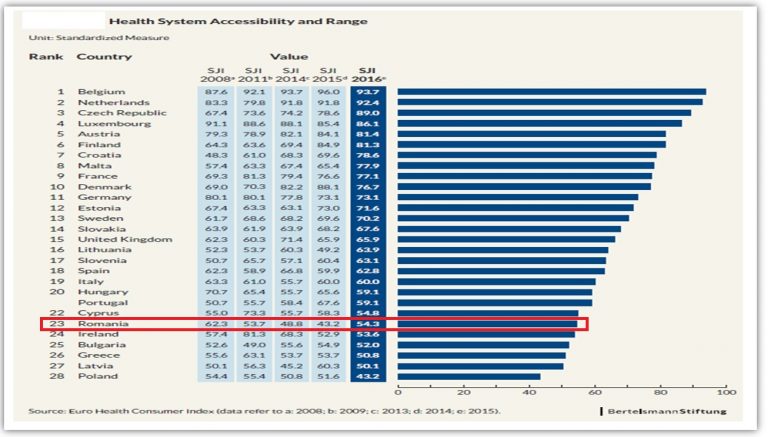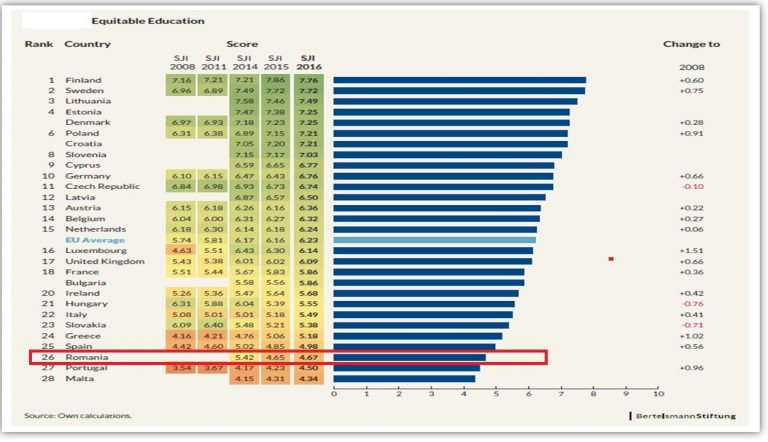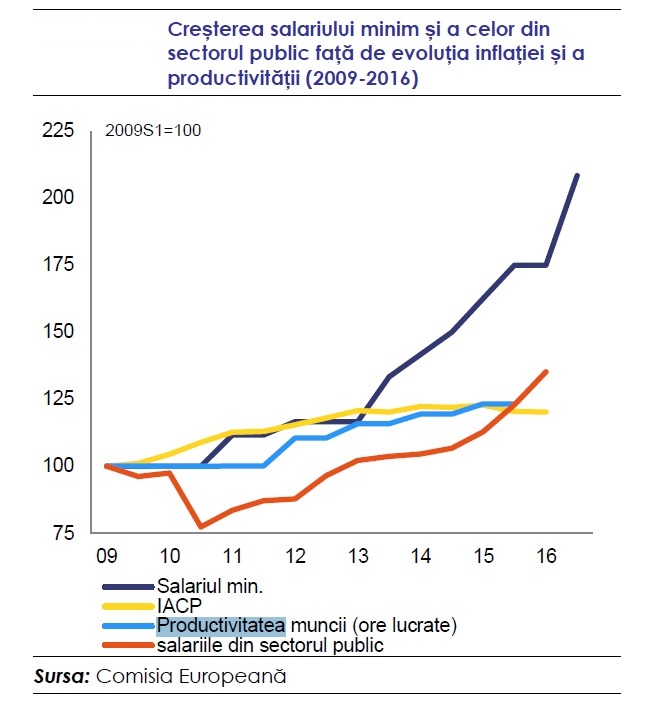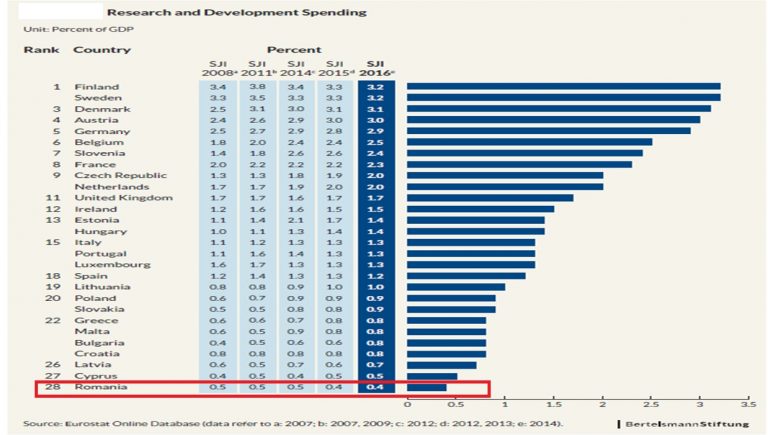 Sacrificing investment in the budget execution of the first two months of the year brings the analysis of the „2017 Country Report – Romania”, issued by the European Commission (EC), back to the forefront.
Sacrificing investment in the budget execution of the first two months of the year brings the analysis of the „2017 Country Report – Romania”, issued by the European Commission (EC), back to the forefront.
Thus, Romanians’ welfare must be sustainable, based on employing a healthy and educated workforce in serious investment projects (especially public ones), processes stimulated by a responsible public administration.
On the contrary, „wages in the public sector have been recently increased – education and healthcare – but that has been made ad hoc, without applying a comprehensive policy based on the employees’ level of qualification and the results„, says the Country Report issued by the EC.
Adverse effects
Capital expenditure uses 60% of the Gross National Income (GNI) and 40% of GNI remains for salaries, according to Valentin Lazea, Chief Economist of the National Bank, at the launch of the report mentioned.
Why?
The forced increase in the share of wages takes from the money meant for roads, investment in the education and the health of the workforce, meaning the investment money for higher productivity. Which sooner or later will also be seen in the wages, or more precisely in the purchasing power.
When sizing the labour cost, „foreign or Romanian entrepreneurs make the plan based on what they need to pay, the roads that take longer to drive mean more spending, production that means costs, legal framework that means lawyers, legal experts and so on, which means costs and consequently lower wages,” said the Chief Economist of BNR.
Education and health of workforce
The state should invest and encourage investment in the workforce’s education and health, so that the wages to reflect its value, according to the priorities in the field that the Chief Economist of BNR emphasised in the Country Report of the EC:
In Education:
- Increasing the share of students enrolled in the vocational education and training (VET)
- Decreasing the illiteracy reflected by the PISA tests
- Equitable access to education
- Decreasing the early school leaving
- Reducing the number of NEET young people (neither employment, education or training)
- Participation in lifelong learning
Romania’s score is among the lowest in the European Union:
- Reducing child mortality
- Decreasing the share of deaths from circulatory system diseases
- Consolidation of out-patient services
- Equitable access to the healthcare services
- Increasing healthy lifetime
Romania ranks among the last countries in the EU in terms of access to the healthcare system:
 Issue of productivity
Issue of productivity
Compliance with the Transportation Master Plan, adopted in September 2016, is a condition to increase the productivity which would also create conditions for a better distribution of the national income, according to Valentin Lazea.
„If we would like to talk about wages in Romania, we should first solve the problems of the roads, infrastructure in general, production, justice and so on,” says the Chief Economist of BNR.
In the meanwhile, the previous wage increases have inspired new segments of state employees to ask for money. The threat of strikes will lead to compromises reached without any regard to productivity and investment that would increase productivity.
*
- Increase of the minimum national wage and the wages in the public sector compared to inflation and productivity (2009-2016)
- Minimum national wage
- IACP
- Work productivity
- Wages in the public sector
- Source: The European Commission
*
The Chief Economist of BNR believes that the main measures for increasing productivity must aim, in the field of research and development (R&D), to:
- Increasing budgetary allocations for R&D from 0.29% of GDP to the targeted 1% of GDP (2020).
- Establishing some central bodies to counter the fragmentation of the R&D field between over 150 public institutions.
- Concentrating the investment in the „ELI-Laser Valley” project, for Turnu Magurele project.
Romania ranks the last in the EU, by share of R&D expenditure in GDP.
- Increasing the number of companies and people with IT skills
- Covering the white areas by high-speed broadband infrastructure – 700 localities (Ro-NET project)
- The widespread use of the Internet in education and healthcare
Cadastre and land registry need:
- Decreasing the time needed to complete a contract of cadastre for an administrative territorial unit (UAT) from 76 to 50 weeks
- Completion of the cadastre for the UATs located along the routes that include the highway construction priorities, by the end of 2018
Agriculture needs:
- Encouraging farm consolidation by grouping small producers
- Increasing the irrigated land by combining the pumping irrigation and gravity drip irrigation
- Reviving the agricultural education and consultancy
Energy field needs:
- Increasing energy efficiency in the household sector by thermal insulation and connection to proximity thermal power stations
- Further liberalization of the natural gas market
- Connection to the European energy system (electricity and gas)
Above all these is the importance of the efficient use of material resources, by increasing the collection rate of reused materials and elaborating, finally, the waste recycling plan.
Issue of public responsibility
Structural reforms to increase potential GDP also mean increasing the responsibility of public administration for decisions, says Valentin Lazea, emphasizing the idea from the Country Report. To do so it would require:
- The selection based on merit and stabilization of the public administration beyond the electoral cycles
- Increasing the coherence of public administration, by constant monitoring ensured by a central government body
- Online communication with the service users and acceptance of electronically signed documents
Of course, the responsibility of public administration also means a responsible tax policy. „Starting the first quarter of last year, we are on a surplus of demand and from that moment, it is no longer justified to make up the fire, by expansionary tax policies, which merely increase the flame just at the wrong time,” believes Valentin Lazea.
In a review made when the Country Report has been launched, the Chief Economist of BNR notes that a responsible public administration also means:
- Strengthening the capacity of developing mature projects for attracting the European funds and
- Reducing the delays related to public procurement and bureaucracy
- Applying the primary and secondary legislation adopted in 2016 on public procurement
- Finalizing the public procurement guidelines on the website by 2019
- Operationalisation of the anti-corruption measures
It is basically about attracting Foreign Direct Investment (FDI) and the development of the domestic capital and with this aim, the EC report draws attention to the need of:
- Developing the transportation infrastructure (see the “Productivity” chapter)
- Developing the workforce (see the “Employment” chapter)
- Reducing bureaucracy and corruption
- Predictability and stability of the legal framework
What the European Commission did not say is what everybody knows, and the BNR Chief Economist does not hesitate to repeat that there is also a need of:
- Improving the relationship between local authorities and investors and
- Non-discriminatory state aid allocation












